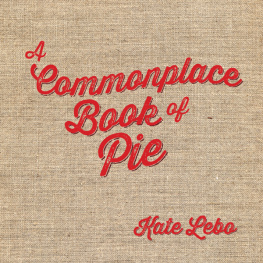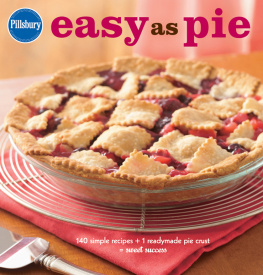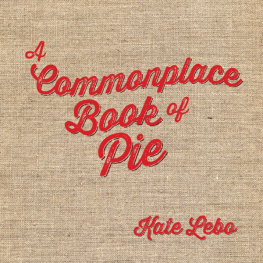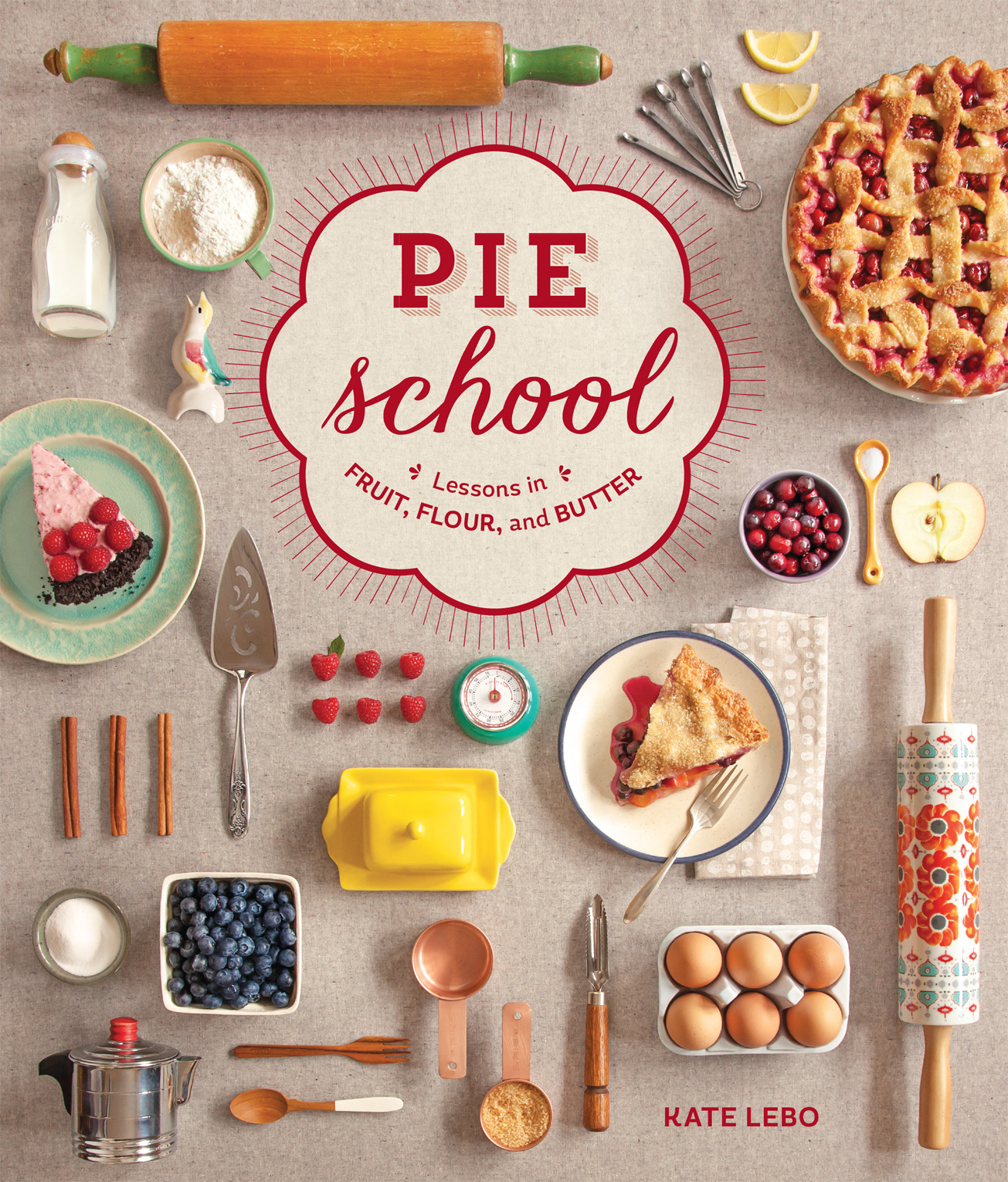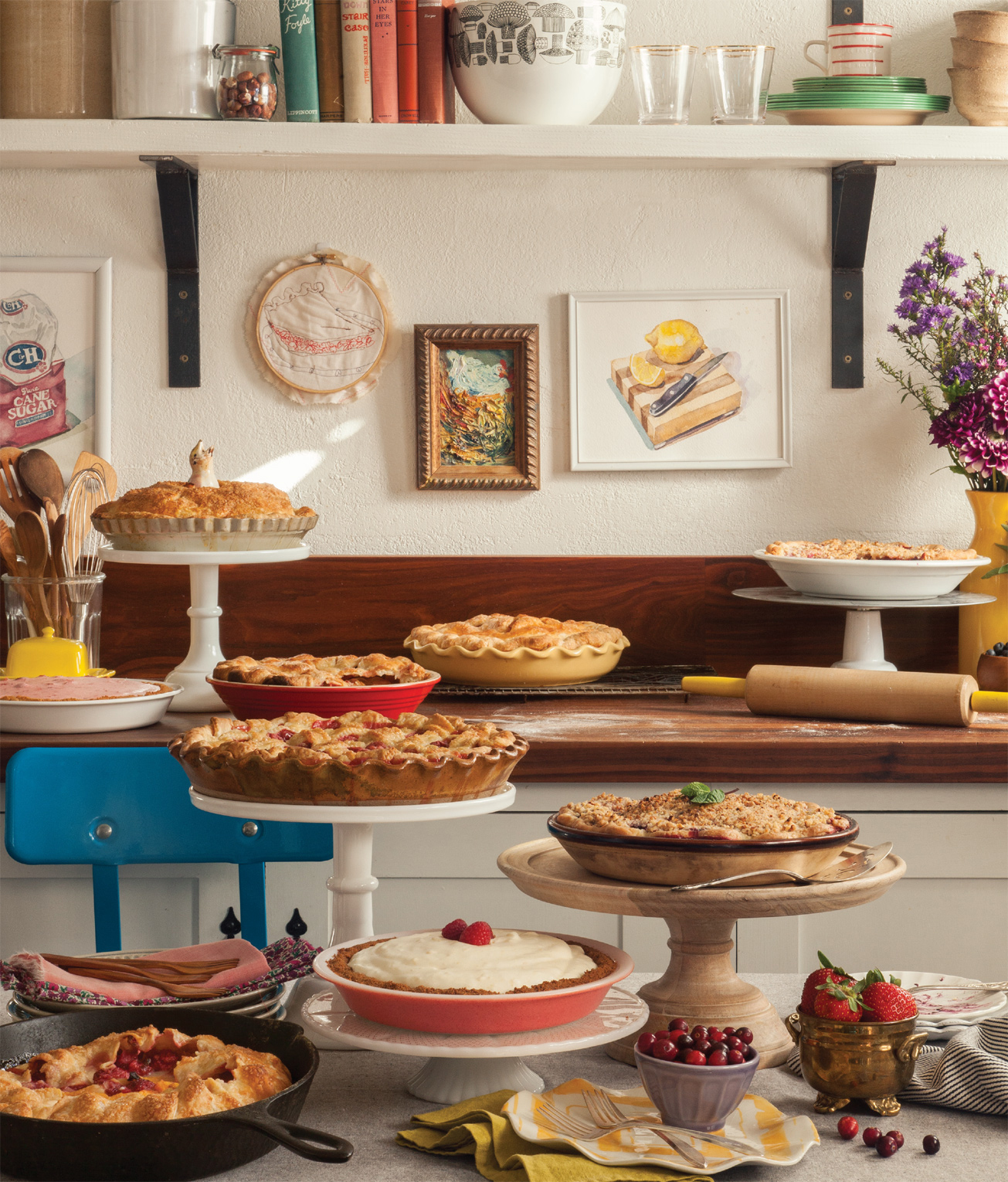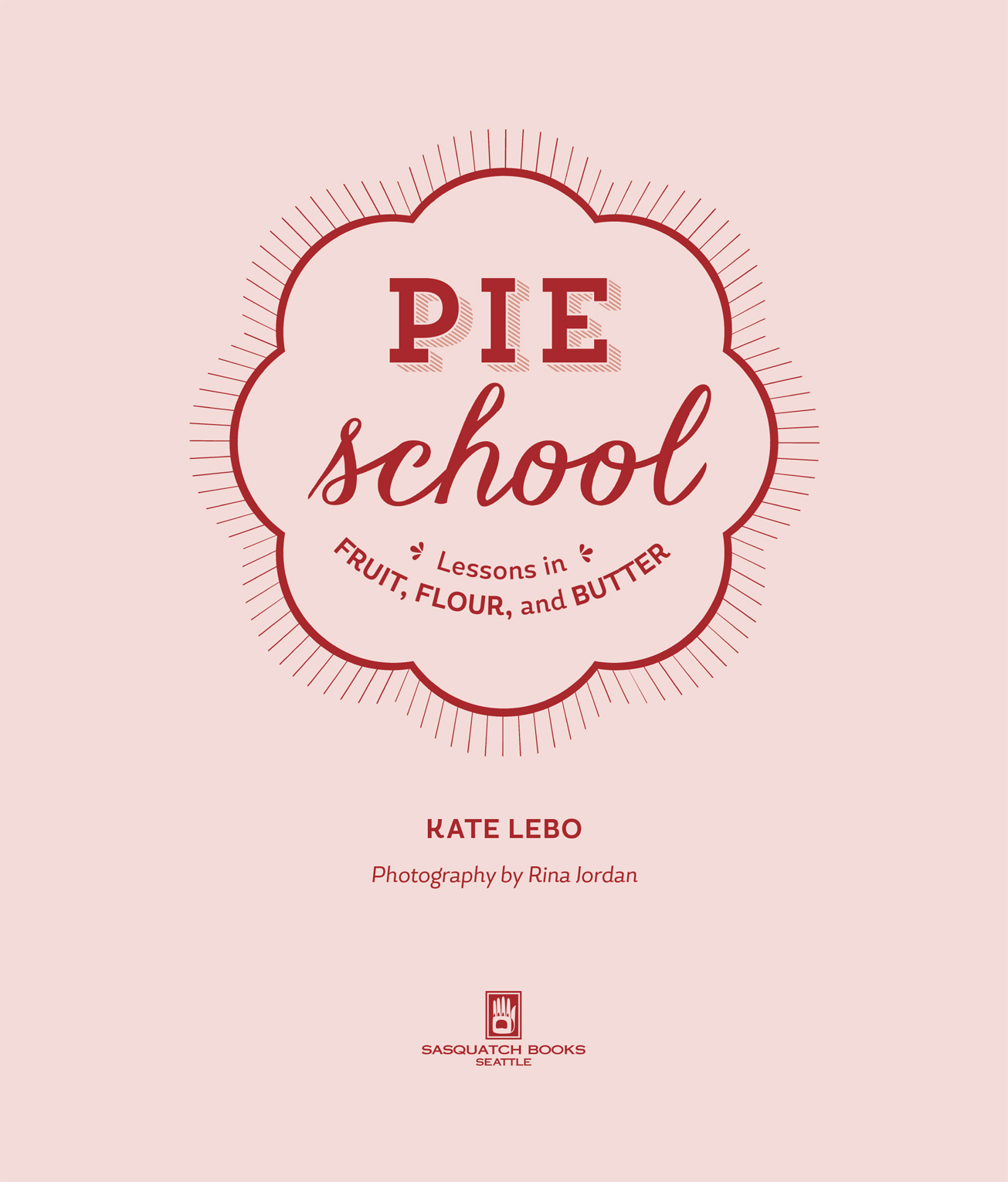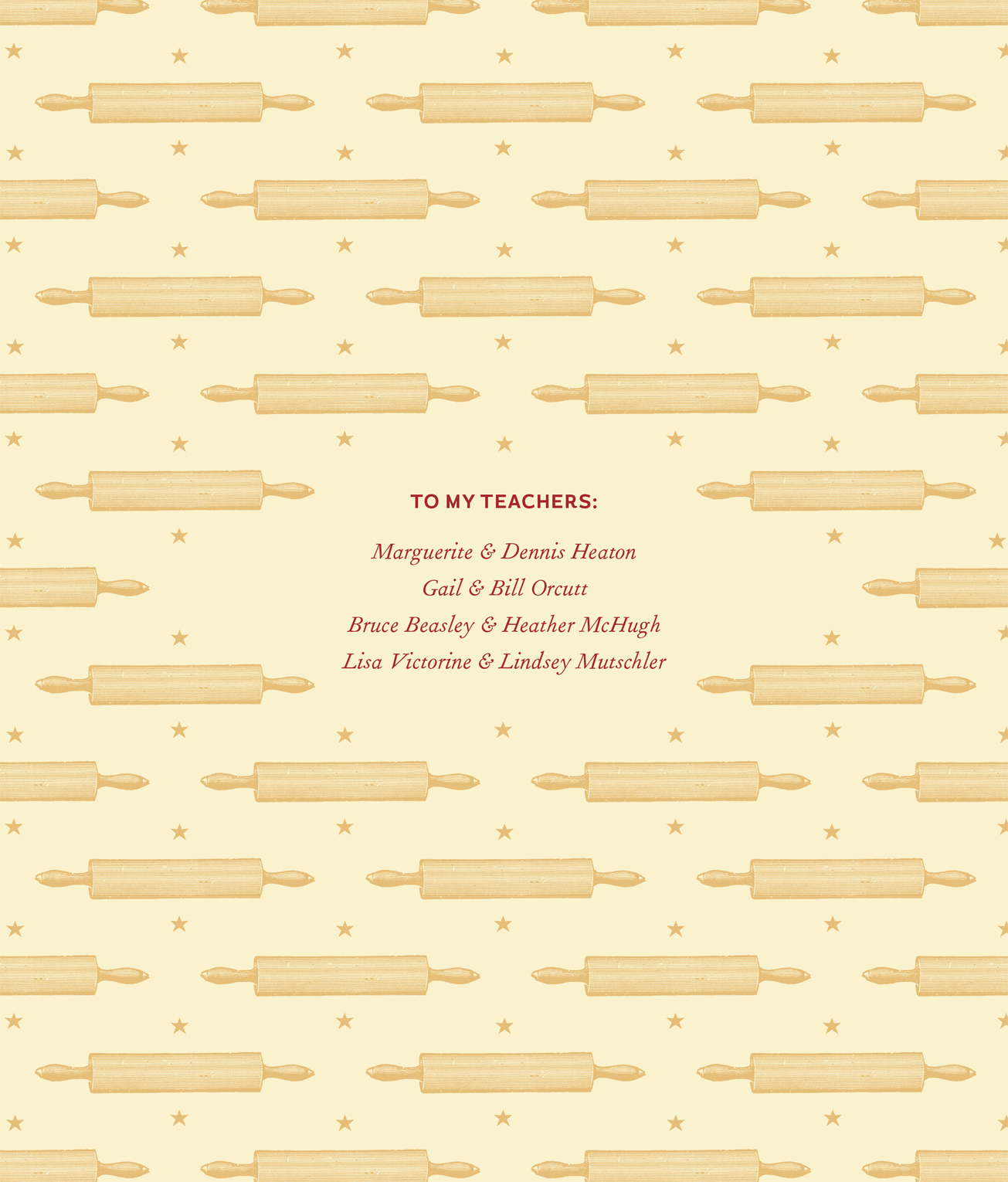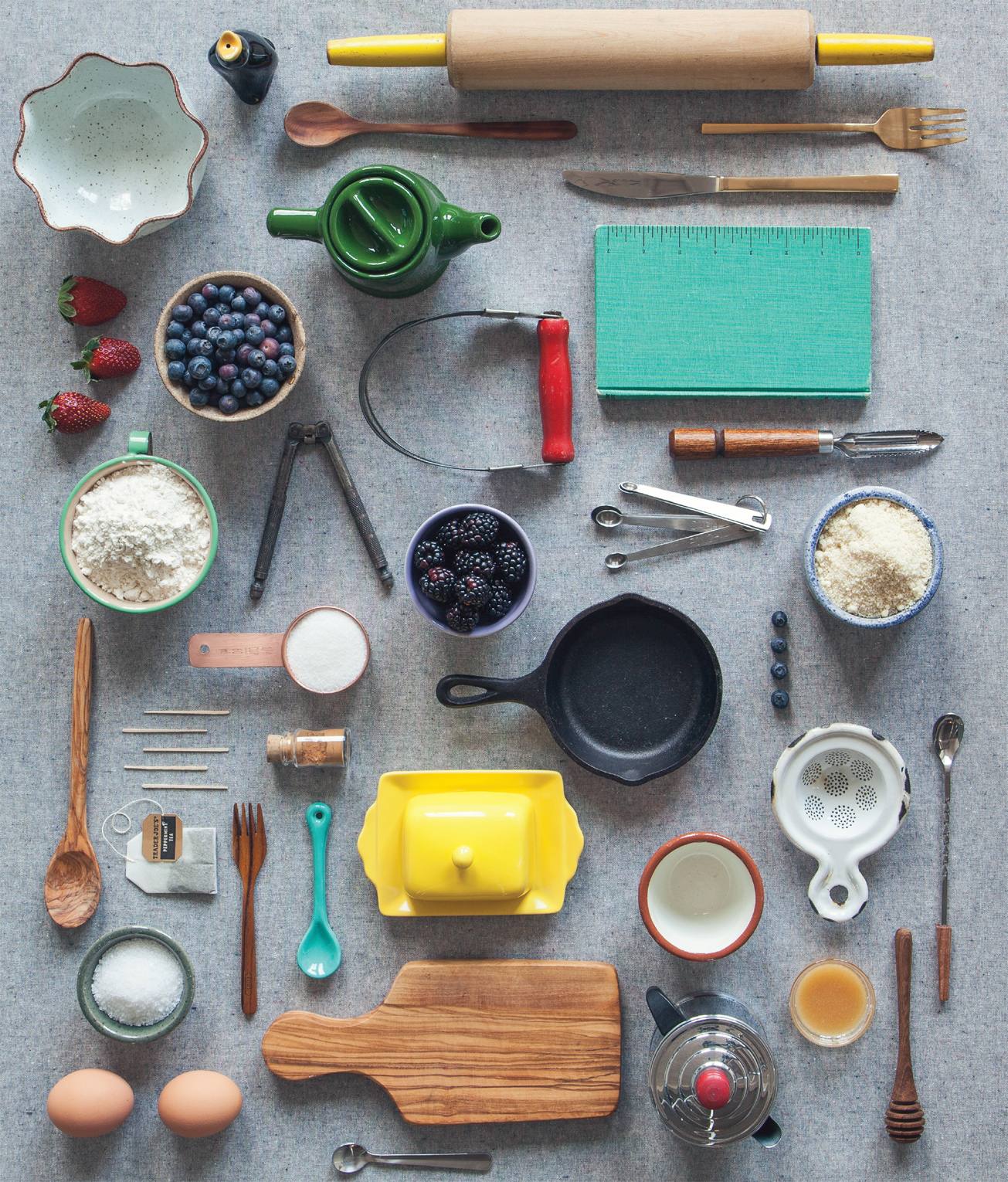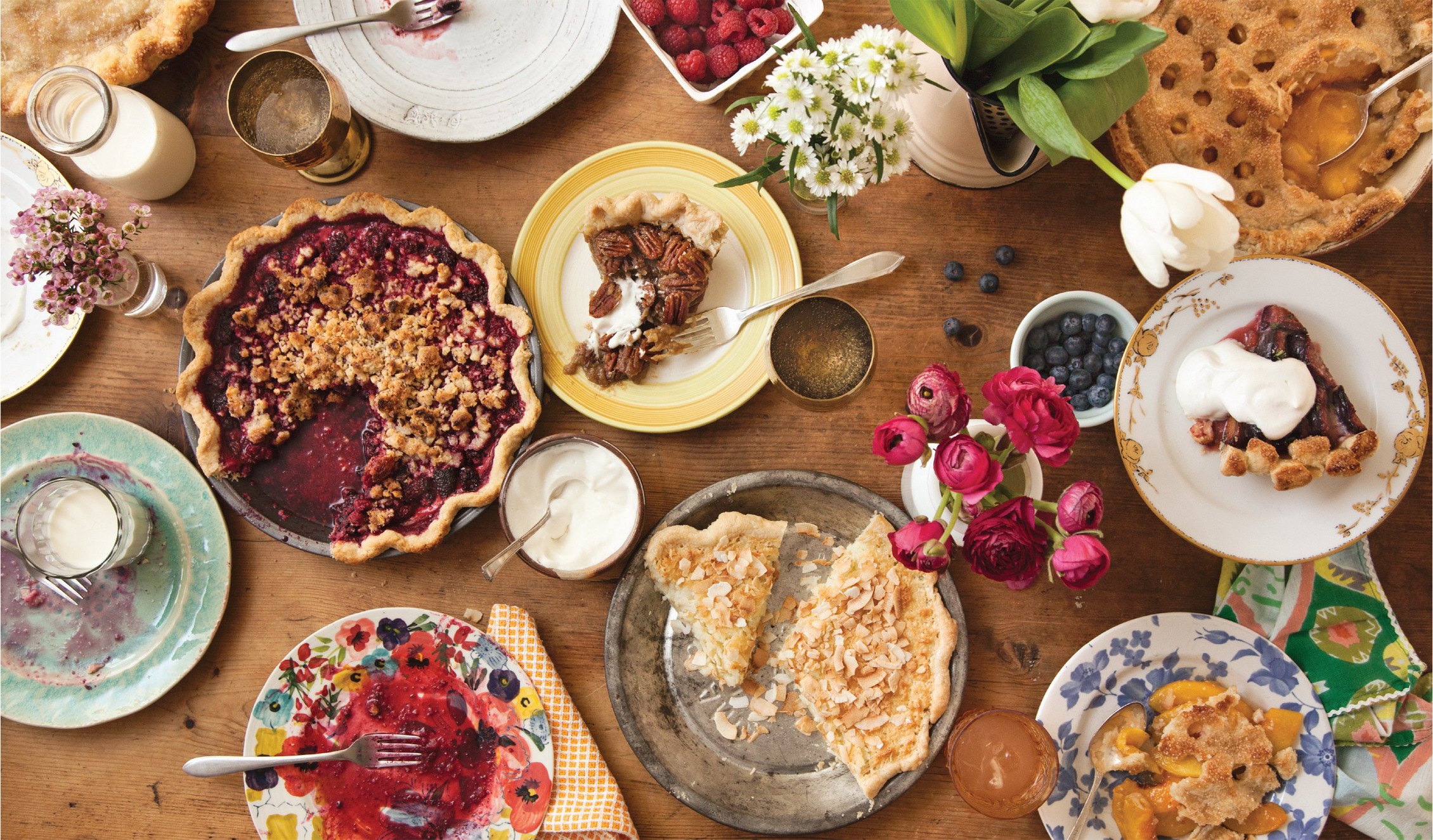Copyright 2014 by Kate Lebo
All rights reserved. No portion of this book may be reproduced or utilized in any form, or by any electronic, mechanical, or other means, without the prior written permission of the publisher.
Published by Sasquatch Books
Trade paperback editor: Gary Luke
Trade paperback project editor: Michelle Hope Anderson
Design: Anna Goldstein
Photographs: Rina Jordan
Food styling: Jean Galton
Prop styling: Jenn Elliott Blake
Copy editor: Diane Sepanski
Library of Congress Cataloging-in-Publication Data is available.
eBook ISBN: 978-1-57061-911-3
Trade Paperback ISBN: 978-1-57061-910-6
Sasquatch Books
1904 Third Avenue, Suite 710
Seattle, WA 98101
(206) 467-4300
www.sasquatchbooks.com
v3.1
contents
introduction
Thanks for joining me, fellow pie lover. Lets get acquainted.
I am a writer, teacher, and baker. I founded this school when I was about to graduate from the MFA program at the University of Washington. As a flip answer to the question, What are you going to do with a creative writing degree? I said, Start a pie school, diverting attention from the fact that I wasnt exactly entering a booming job market, and no, I didnt have a plan. With enough repetition, the idea started to seem like a good one. It stuck. I applied for a business license, made a website, and rented a bakery kitchen in Seattle. My students and I tied our aprons and learned together how to make what we could with what we had. They went home with a pie; I went home with plenty to write about. My crazy idea was looking saner by the day.
But the story begins long before that first class.
I was raised in the Pacific Northwest by Iowans. If were talking in broad generalizations, that means I come from friendly people whod rather eat than argue.
We lived in a small city just north of Portland, Oregon, that people often mistake for a much larger Canadian city, sometimes so badly they wander to the wrong side of the state and wonder why they dont need their passports to cross the Columbia River. By trading fireflies and snow for volcanoes and rain, my parents gave me a personal topography that is damp, moody, exaggerated, and rich, with the conquered beauty of the Discovery Channel and the lurking wildness of the West.
I learned the geography of my region at the grocery store. Sweet apples from Wenatchee, pie apples from Skagit Valley. Cherries from Hood River, peaches from Yakima. Strawberries from Cornelius, plums from the neighbors, blueberries from my own backyard. And, of course, blackberries. On mountainsides, on roadsides, in the last bit of forest left in the housing development. Poet Mary Oliver calls them the black honey of summer. I called them lunch.
My first apartment in Seattle had a view of the Space Needle and the busiest chunk of I-5 in Washington State. I joked that except for the air brakes and car horns, it sounded like the ocean (it sounded like exactly what it was: a 24/7 traffic jam). On Thursday nights, with 90.3 KEXPs hard-core honky-tonk show blaring on my radio, my parents on speed dial, and Joy of Cooking cracked on the kitchen counter, I taught myself how to bake.
My culinary romance started with a hunger for making thingsI couldnt afford to buy DIY supplies, but I did have to eat. Flour and sugar stood in for fabric and glass, peaches and blueberries for thread and yarn. Thats the best explanation I have for what happened when, after baking my way through cookies and cakes and bread, I made my first pie: love. Not with eating itlike Star Trek and cats, I cant remember a time I wasnt a big fan of pie. I fell in love with the materials, in love with the process. I was at home. A natural. Easy as pie.
Soon, baking became hopelessly intertwined with writing. I baked to procrastinate on a poem; I baked to have something to blog about; I baked because, unlike writing, I knew when the pie was done and I knew if it was good. I didnt get irritated with pie for being anything but what it was. When I gave it to people, they knew exactly how to respond: with delight, appetite, and thanks. Poems are harder. They should be. I needed baking to comfort myself through the hard parts (i.e., almost every part of writing) and fuel the good parts (pie in one hand, pen in the other). As the grocery bills piled up, I formed a habit of baking that helped teach me the habits of writing. Writing helped me understand that pie is a powerful symbol of American culture. More importantly, pie is a powerful gift. Im writing this book to share that gift with you and to teach you how to tap into that power in your own kitchen.
Now its your turn. You and I can talk about books but we cant talk through them. Forgive me as I make a few assumptions.
Youre the sort of person who reads books about pie, so Im guessing you like to bake. Youre also the sort of person who will actually read a cookbook (assuming youre reading these words right now) instead of skimming through for a grocery list, so Im guessing you like to understand why you bake as well as what you bake.
Maybe you get shy around pastry. Maybe you want to figure out how to make your own pie recipes. Maybe youre a pie expert and youve come to learn something new, or to reaffirm that your way is better. And it might be better! For you. Teaching pie is a bit like teaching poetry. All I can do is show you the elements of any good pie (or poem) and help you make them with the techniques that have worked best for me.
Many pie-making methods wont be mentioned in these pages. Store-bought crust, for example. Were going to pretend it doesnt exist. You wont find cream pies or chocolate pies either. Why? My gift is for fruit pie, not cream pie. A bevy of cookbooks have already covered the art of the cream pie far more competently than I could, so Ill leave that to them. You also wont find many food processor or even pastry cutter instructions here. Writer and baker Beth Howard says it best: Your hands are your best tools. Advance apologies to any ruined manicures.
Heres what you will find: a lot of recipes that use seasonal produce. Thats my specialty and my obsession. Youll encounter ideas for how to make pie-making the sort of thing you do with what you have on hand. Youll attempt to learn, as I did by writing this book, what it is about pie that people love.
Im a pie-maker.
Youre a pie-makeror you soon will be.
Welcome to Pie School.
Now, lets go wash our hands.


